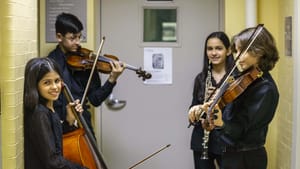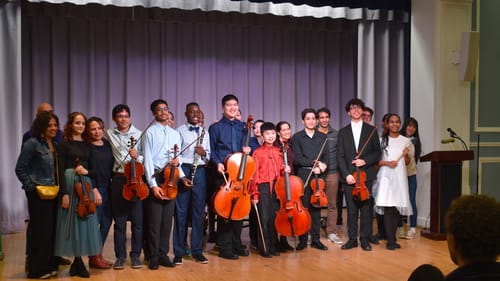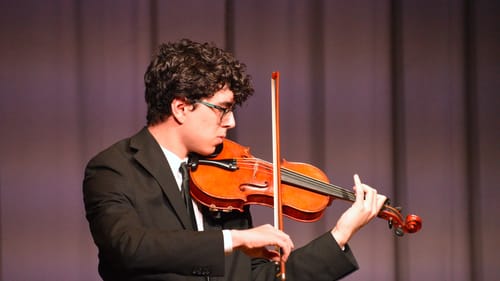Stay in the Loop
BSR publishes on a weekly schedule, with an email newsletter every Wednesday and Thursday morning. There’s no paywall, and subscribing is always free.
Diversifying the orchestra starts with the students
Philadelphia Music Alliance for Youth opens doors to classical music careers

This summer, another cohort of teenage students in our area graduated from the Philadelphia Music Alliance for Youth (PMAY) Artists’ Initiative. This unique local program, now in its eighth year, supports young musicians from communities that have been historically excluded from classical music professions.
PMAY primarily enrolls students whose heritage is Latino, Black, African, Native American, South Asian, or Southeast Asian. According to program director Najib Wong, “fewer than five percent” of professional musicians in the symphony orchestra field represent these backgrounds. While PMAY doesn’t provide the music lessons themselves, it provides mentorship, opportunities, and connections that give young people better chances to secure careers in music. These include masterclasses, group recitals, mock auditions, and college application counseling. PMAY hosts “juries” to evaluate student progress each year, while students generally take lessons throughout the year with a private teacher or at one of PMAY’s partners, which include Temple Music Prep, Project 440, Settlement Music School, Philly Youth Orchestra, Musicopia, and Philadelphia Sinfonia.
Battling imposter syndrome for underrepresented students
Wong grew up in Singapore, where he says an opportunity for free trumpet lessons set him on his path to a music degree overseas and a full-time career. He appreciates the impact a single significant opportunity can have on a student, especially a student whose family has a low income or no connections in classical music. Lesson costs, instrument costs, time, and transportation access all create unequal challenges for music students, but feelings of isolation and “impostor syndrome” burden certain students as well.
“They might come from a school or neighborhood where they might be the only one seriously passionate about classical music, and it's not something that their families or neighbors or friends do,” Wong explains. “They require a lot of reinforcement that it’s valid, that it's okay for them to do it. And just being part of this program, they see so many other students like them.”

PMAY also trains instructors and leaders at each partner organization to recognize these personal challenges. For example, some students who join PMAY as teenagers have not had private lessons before, so they might feel behind in their technical development compared to their classmates, and they may become shy. An instructor trained by PMAY recognizes when students are experiencing these feelings, helps support them to catch up to their classmates, and reaffirms their sense of belonging in that classroom.
Finding the students who take music seriously
Adam Elbohy (pronounced el-BOO-hee) just graduated from Upper Dublin High School in Montgomery County, and he spent the last two years in PMAY. “None of them were taking it seriously or planning on doing it professionally,” he says of the other students in his music classes at school. PMAY introduced him for the first time to “other kids with similar backgrounds [who] were also taking music seriously.”
Elbohy started violin at an early age with group lessons at his school, some private lessons, and then later his school orchestra and PMEA District Orchestra. But he had no musicians in his family, and his parents had attended college outside the US, so PMAY provided him crucial guidance during his junior and senior years. A mentor helped him apply for summer programs and colleges, prep for auditions and interviews, and contact college faculty whom he wanted to meet—PMAY pointed him toward faculty in its network, then Elbohy took the initiative to write emails, make plans with them, and make an impression.

He earned acceptance to Oberlin College and Conservatory, but the tuition seemed impossibly high, and no one in his family knew how to earn more financial aid. Then, he remembers, PMAY staff recommended “reaching out to the [violin] teacher, which I had no idea was possible. But the teacher can vouch for you in the financial aid office. That's what made it possible for me to go to Oberlin.”
Elbohy hopes that, in future years, PMAY can create more opportunities for its seniors and juniors to speak with younger students who enroll as early as fifth grade. He didn’t have older music mentors as a child that age, but growing through PMAY later taught him that “whatever you're going through and whatever you have in the future, people are doing it, and people have already done it.”
A growing network of support
Wong hopes PMAY can begin enrolling students in greater numbers each year. And as its alumni network grows larger and older, its current students will have connections in more professional spaces—2018 alum Na’Zir McFadden already assistant conducts the Detroit Symphony Orchestra. Wong promises, “As more and more of our students graduate and represent themselves, not only in classical music but in Philadelphia, you'll see more and more students having more support.”
Sign up for our newsletter
All of the week's new articles, all in one place. Sign up for the free weekly BSR newsletters, and don't miss a conversation.

 Thomas Hagen
Thomas Hagen